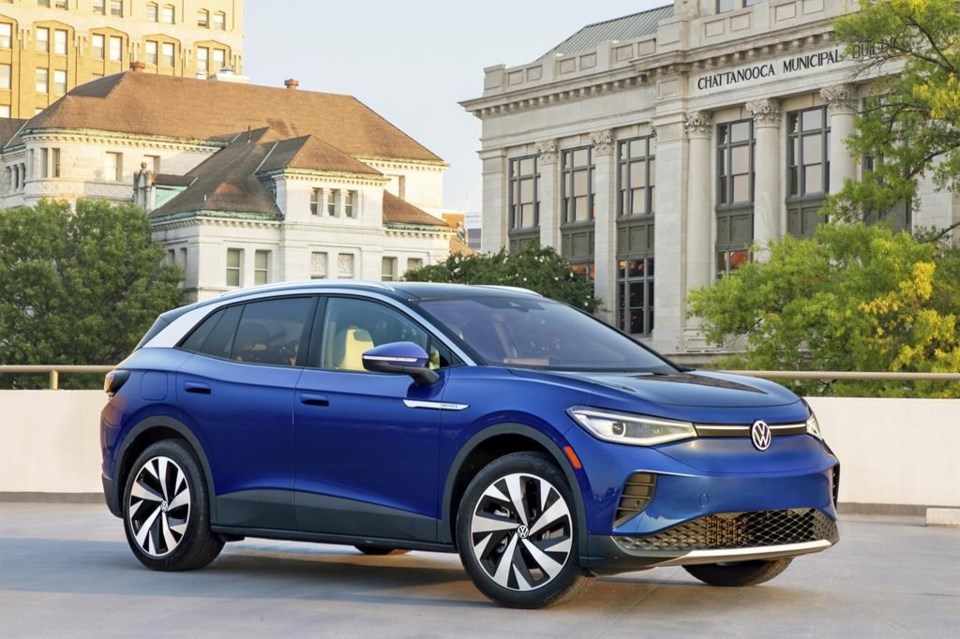Toyota largely pioneered hybrid vehicles, and its extensive lineup of gas-saving models today is a testament to that. But it’s taken a while for Toyota to finally come out with its first mass-market electric vehicle: the all-new 2023 Toyota bZ4X. This is a small SUV that’s about the same size as the brand’s RAV4 and offers many of the same appealing qualities such as a comfortable ride and available all-wheel drive.
However, the bZ4X is taking trails that have already been blazed by other automakers. One key rival shoppers should consider is the Volkswagen ID.4. This is VW’s first electric SUV and it too promises to deliver familiar brand traits for a new electrified world. Which battery-powered SUV is the better buy? Edmunds experts compared them to find out.
RANGE AND PERFORMANCE
One of the most important things a modern EV needs to satisfy buyers is enough range to allow for daily commuting and the occasional road trip. The bZ4X gets an EPA-estimated driving range of 222-252 miles depending on the model. Other rival EVs can go farther, but the bZ4X’s range is sufficient.
In the Volkswagen ID.4′s case, it’s the new base model that has the shortest range. Called the Standard trim, it receives a smaller battery pack good for just 208 miles. All other trims have a larger battery pack that provides up to 275 miles of range.
Edmunds also does its own real-world range testing. Here, a rear-wheel-drive 2021 ID.4 outperformed its EPA estimate of 260 miles, making it 287 miles on a full charge. A bZ4X Limited in the same test underperformed: The EPA estimate for the model we tested was 242 miles, but we managed to go just 227 miles.
With the ID.4, choosing all-wheel drive bumps power up from 201 horsepower to 295 horsepower. The bZ4X’s gains are more modest, going from 201 horsepower to just 214 horsepower. Both cars in single-motor form are fine for driving around town, but dynamically the ID.4 is the better-driving SUV. With its higher real-world range and quicker acceleration, the Volkswagen is the superior choice in this matchup.
Winner: ID.4
INTERIOR AND TECHNOLOGY
The ID.4 and bZ4X both have tech-focused interiors but aren’t as minimalist as the Tesla Model Y’s cabin. Front and center inside the bZ4X is an impressively wide 12.3-inch touchscreen, which is Toyota’s sharpest and most responsive to date. There’s also a digital instrument panel set far back on the dash. But other than those details, the bZ4X’s cabin is pretty conventional.
The 2023 ID.4 gets a 12-inch touchscreen as standard, which also looks impressive but is somewhat unintuitive with its controls and menu layout. Beneath that are touch buttons for the climate control system that don’t offer haptic feedback, which might leave you wondering if you pressed them or not while your eyes are on the road. Both EVs come with wireless Apple CarPlay and Android Auto smartphone integration and a wireless charging pad. Should you need a wired connection, there are also plenty of USB-C ports in each. Space-wise, these two should feel about the same, though on paper the ID.4 is larger in most interior dimensions.
Winner: Tie
PRICING AND VALUE
With the release of the new 2023 ID.4 Standard trim, Volkswagen’s electric SUV undercuts the bZ4X’s starting price by around $4,500. The trade-off, of course, is the base ID.4′s shorter range. If you can live with that, you get pretty much all the same features as the Pro model for a good chunk less. Speaking of features, both EVs come loaded with standard convenience and tech features, including advanced driver assist features such as adaptive cruise control, lane keeping and blind-spot warning.
Electric vehicle tax credits are likely to be a major factor in your purchase decision. Due to recent changes in how the tax credits are awarded, the bZ4X will not qualify since it is not built in North America. Volkswagen says it will start building the 2023 Volkswagen ID.4 in Tennessee, which means the 2023 ID.4 will qualify for the full $7,500 federal EV tax credit but only if you buy one in 2022. The requirements will get stricter in 2023.
Winner: ID.4
Edmunds Says: Toyota’s first EV is a noble effort, but it misses the mark in a few key areas. Its mediocre driving range, uninspiring performance, and relatively high price for what you get make it less attractive when compared against its peers. We’d go with a big-battery ID.4 for its long list of features and more-than-adequate range.
_______
This story was provided to The Associated Press by the automotive website Edmunds. Alex Nishimoto is a contributor at Edmunds. Follow Alex on Twitter.
Alex Nishimoto, The Associated Press


